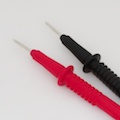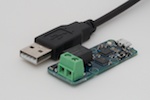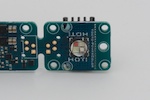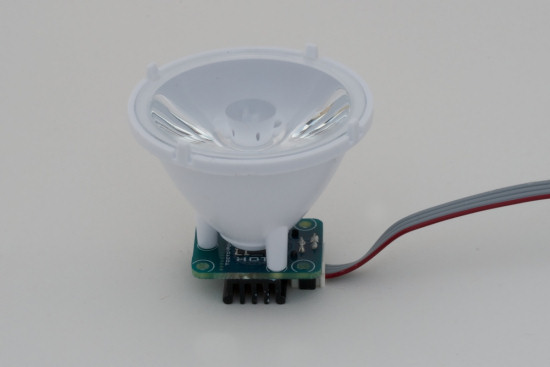 As some of you may have noticed, we have just published updates of the programming libraries, of the VirtualHub, and of the firmware for all the modules. What are the improvements? You'll find all the details in this article, as well as a few words on the two new products which we just released: the Yocto-Volt and the Yocto-PowerColor.
As some of you may have noticed, we have just published updates of the programming libraries, of the VirtualHub, and of the firmware for all the modules. What are the improvements? You'll find all the details in this article, as well as a few words on the two new products which we just released: the Yocto-Volt and the Yocto-PowerColor.
The main reason for this synchronized update of the programming libraries, VirtualHub, and firmware is the addition of new, more optimized variants of the communication protocol between the computer and the modules. We noticed, during stress tests, that some small modifications produced a great efficiency improvement, thus increasing the module reactivity, in USB as well as in TCP/IP through the VirtualHub. Moreover, we also noticed that downloading the recorded data from the data logger was really too time consuming when the memory was full (shame!), and we have made improvements in this area as well in the library and in the firmware, providing a great speed increase.
To benefit from these protocol improvements, you need to update the library, the VirtualHub, and the module firmware. If one of these components is not up-to-date, and therefore not able to manage these new protocols, nothing drastic happens but the improvements aren't used. This is the behavior you'll always find for minor updates in our libraries and our firmware: we guarantee compatibility between all the minor variants of the library and the firmware. Therefore, don't panic: there is no emergency to recompile everything the day you buy a new module with a more recent firmware...
An important point: from this new firmware revision onwards, you need an up-to-date version of the VirtualHub to install new firmware. It is the price to pay to enable us to guarantee that updating goes smoothly and that settings are preserved when updating, whatever the modifications brought by the new firmware. Currently, if you try to update with an old VirtualHub, you'll receive an unfortunately rather cryptic message indicating that the format of the new firmware is not supported. (Invalid file, the file you chose is not a Yoctopuce firmware (Bad file format (upgrade your tools) (yprog:126))). However, from this new VirtualHub onwards, you'll receive clearer information on the required version. Moreover, the VirtualHub now indicates when a new update is available in a status line.
A few other improvements:
- The interface of the Yocto-Knob is much more reactive, and visual feedback during calibration functions correctly on all browsers;
- The Yocto-Servo supports using servo-motors with extended range, and the configuration of a non-standard neutral position;
- The VirtualHub is now entirely compatible with Internet Explorer, including HTML5 support for Internet Explorer 9.
This is it for software. But this week, we are also releasing two new products: the Yocto-Volt and the Yocto-PowerColor.
 The Yocto-Volt is a USB voltmeter. Not a simple analog voltage input with common ground, as it is the case in most of the products you can find in the competition, but a true measure of the differential floating potentials, as you expect it from a voltmeter. You can use it to precisely (0.01V / 0.5%) verify the tension produced by a battery, by solar panels, etc. As with most of our captors, this module is equipped with an autonomous data logger on a flash memory, allowing you to use it in embedded applications and analyze the measures offline. The USB control electronics is electrically isolated (up to 500VAC) from the measuring electronics. This allows you to measure even the power of the mains. Beware, however, not to play with this without beforehand protecting the module in an isolating case to protect you from electrocution.
The Yocto-Volt is a USB voltmeter. Not a simple analog voltage input with common ground, as it is the case in most of the products you can find in the competition, but a true measure of the differential floating potentials, as you expect it from a voltmeter. You can use it to precisely (0.01V / 0.5%) verify the tension produced by a battery, by solar panels, etc. As with most of our captors, this module is equipped with an autonomous data logger on a flash memory, allowing you to use it in embedded applications and analyze the measures offline. The USB control electronics is electrically isolated (up to 500VAC) from the measuring electronics. This allows you to measure even the power of the mains. Beware, however, not to play with this without beforehand protecting the module in an isolating case to protect you from electrocution.
 The Yocto-PowerColor is the big brother of the RGB led module Yocto-Color which you already know, but... much more powerful. Using in an optimal way all the current available by USB (500mA), this module provides up to 2.3W to a powerful color led, precisely regulating the current to compensate for variations due to the heat. The module is equipped with a small radiator which helps to dissipate the heat in excess when working at full power. Caution, do not look directly at this led, it would hurt your eyes... You can fix on this module a reflector which you can buy separately, at Farnell for example.
The Yocto-PowerColor is the big brother of the RGB led module Yocto-Color which you already know, but... much more powerful. Using in an optimal way all the current available by USB (500mA), this module provides up to 2.3W to a powerful color led, precisely regulating the current to compensate for variations due to the heat. The module is equipped with a small radiator which helps to dissipate the heat in excess when working at full power. Caution, do not look directly at this led, it would hurt your eyes... You can fix on this module a reflector which you can buy separately, at Farnell for example.

You can equip the Yocto-PowerColor with a reflector


